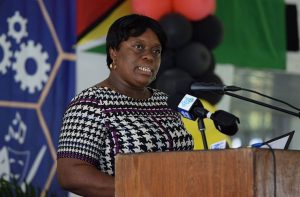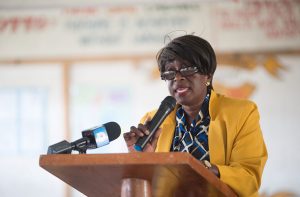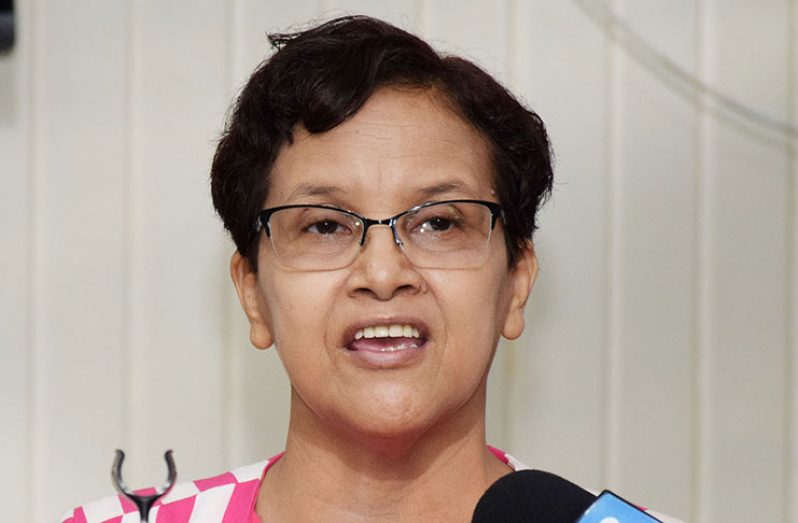— NGSA, CSEC, CAPE candidates to turn out June 15, three days weekly
— Teachers to report to school on June 8
— 11,898 CSEC candidates, 852 CAPE candidates for exams
ALL National Grade Six Assessment (NGSA), Caribbean Secondary Education Certificate (CSEC) and Caribbean Advanced Proficiency Examination (CAPE) learners are expected to return to school from Monday, June 15, 2020, to facilitate face-to-face preparation with teachers for the upcoming examinations.

The learners will attend school only on Mondays, Wednesdays and Fridays for four hours from 09:00 to 13:00 hours. Meanwhile, all teachers must return to schools from June 8.
This is just some of the pertinent information relayed by a panel of senior officials of the Ministry of Education (MOE), on Friday, via a webinar. The engagement comes as the Ministry announced on Wednesday that schools will be re-opened from June 8 to August 15 to facilitate the preparation for, and writing of, the said examinations.
The MOE has also Gazetted an Order signed by Minster of Education, Dr. Nicolette Henry, on June 2, 2020 which outlines clear COVID-19 prevention guidelines to be followed by the MOE, Departments of Education, Headteachers, Mayor and City Council/Town Councils, Parent Teacher Associations (PTAs) and parents/guardians.
THE PRIMARY LEVEL
Speaking on the panel, Assistant Chief Education Officer (ACEO) – Primary, Carol Benn said that all primary school teachers must report for duty from June 8 to prepare for the re-entrance of learners on June 15.
She said: “Teachers will also use this period to prepare themselves mentally for the new norm. The Headteachers and Deputy Headteachers will supervise the preparation and brief teachers on plans and expectations.”
For primary schools, in addition to the protocols outlined in the Order, there will be the sanitisation, fumigation and weeding of grass at all schools considering that they have been unoccupied for some time. No parents will be allowed into the schools compound.
Sanitisation kits will be issued to each pupil during the first week of their re-entrance and these kits will be inclusive of soap, hand sanitisers, face masks and more.
Benn assured the nation that all students will be provided with face masks, teachers will be provided with face shields and handwashing areas will be present. She also added that both teachers and students will be informed of their health and safety expectations and reassurances will come from teachers to quell anxieties.
Meanwhile, Superintendent of Examinations, Sauda Kadir said that the individual timetables for NGSA candidates will be distributed, to schools, from June 8, 2020 via the Regional Education Departments.
“We anticipate and have planned that when candidates return to the student-teacher engagement on June 15, they will be able to receive their individual time tables,” she said.
THE SECONDARY LEVEL
Addressing viewers, Assistant Chief Education Officer (ACEO) – Secondary, June-Ann Gonsalves said that administrators, at individual schools, will prepare a timetable which caters to the days CAPE and CSEC students should attend school. The said days will also be influenced by specific subject areas.

When they meet face-to-face, she said that the pre-exam period will cater for the completion of School-Based Assessments (SBAs) or Internal Assessments (IAs) and the extensive moderation process which is now required by CXC for all SBAs.
If necessary, the period will also cater for the completion or revision of the syllabus. Students will also, through the period, become au fait with the new protocols in place.
“All of our officers will closely monitor the process to ensure that the measures stipulated in the Order are adhered to at all times,” Gonsalves said.
Providing data, Kadir said that there are approximately 11,898 CSEC candidates registered with 70,697 subject entries in 34 subject areas. For CAPE, there are 852 candidates registered with subject entries in 4,388 in 37 subject areas.
“The CXC has not sent the individual timetables or they have not arrived in the country as yet; once they have arrived, we will immediately distribute so candidates will have their individual timetables,” the Superintendent of Examinations explained.
CAREFUL PLANNING
In brief remarks, Chief Education Officer (CEO), Ingrid Trotman, and Director of the National Centre for Educational Resource Development (NCERD), Jennifer Cumberbatch, said that they are aware of the effects of the pandemic on students, teachers and parents and much planning has gone into preparation for the exams.
As a result of the pandemic, Trotman said Guyana has had to close 352 public and private nursery schools affecting 29,740 children; 453 public and private primary schools affecting 90,802 learners and 139 public and private secondary schools, impacting 68,351 students.
Also closed were special education centres — 12 public and 2 private —; Technical, Vocational Education and Training (TVET) — 10 public and 2 private; 18 teacher education centres; 2 university campuses and a number of other private teaching institutions.
Meanwhile, over 11,700 teachers have been affected since March 16, 2020 and the said number does not include lecturers.
During this period, the CEO said that the MOE, through its Alternative Plan Programme, provided home-based learning activities and practice materials for nursery, primary and secondary school-aged children online, via television and radio.
She said that booklets for Grades 2, 4 and 6 were provided to hinterland students who would likely have difficulties accessing the internet and other media.

Trotman said that most teachers also met with their students online and the Education Ministry is in the process of collecting data on the number of students and educators who participated in online teaching to better plan for the future.
The Health Unit of the MOE, in collaboration with the MOPH, developed Standard Operating Procedures (SOPs) for the preparation and implementation of the national and regional examinations. Meanwhile, Regional Education Officers and the Principal Education Officer are integrally involved for regional collaboration.
In her remarks, Cumberbatch said that prior to the crafting of the public health protocols for the reopening of schools for exams, the MOE engaged in many weeks of planning.
Cumberbatch said that stakeholders involved in the planning stage included the Ministry of Public Health; the Pan American Health Organisation/World Health Organisation (PAHO/WHO); the Caribbean Community (CARICOM), the National COVID-19 Task Force (NCTF); the Guyana Teachers’ Union (GTU), parents and teachers.
The NCERD Director expressed that while decisions are generally not easy to make, the involvement of the aforementioned stakeholders made the planning stage possible.
“We have had to go back to the drawing board when we did not get it right because this is something new for us. The Ministry of Public Health would not allow us to have any exams unless lots of things were put in place,” she said. “The Ministry of Public Health has helped us to create protocols for just about everything, things that we didn’t even think that we have to create protocols for; from the gate to the classroom and back.”
She assured the public that the Education Ministry’s aim is to ensure that all persons are safe during the exams. Taking it a step further, she said that the MOE has asked the GTU to make visits to schools to ensure that all protocols are being adhered to or to make recommendations where necessary.
In the days leading up, from June 8-13, the distribution of equipment and materials in preparation for the re-opening will take place.
CAPTIONS SAVED AS: EDUCATION 1-4
EDUCATION 1: Chief Education Officer (CEO), Ingrid Trotman (DPI photo)
EDUCATION 2: Director of the National Centre for Educational Resource Development (NCERD), Jennifer Cumberbatch (DPI photo)
EDUCATION 3: Assistant Chief Education Officer (ACEO) – Secondary, June-Ann Gonsalves (DPI photo)
EDUCATION 4: Assistant Chief Education Officer (ACEO) – Primary, Carol Benn (DPI photo)



.jpg)











